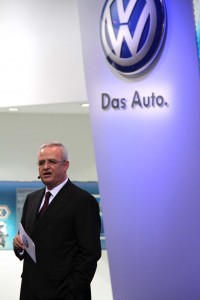The world’s second-largest automaker beat expectations with a strong second quarter profit, up 14.1%, despite a decline in revenues.
The Thursday release of Volkswagen AG’s earnings revealed that its biggest luxury line, Audi AG, helped offset some problems at its namesake brand. The report came as VW begins a major effort to shift its focus from raw growth to a more profitable expansion plan, with Chief Executive Officer Martin Winterkorn planning to cut costs and boost productivity.
“In light of the continued strong competitive pressures, the tense situation in some emerging economies and the fundamental technical and economic changes happening in our industry, we are working hard to create all the conditions we need today to ensure success tomorrow,” the CEO said in a statement accompanying the earnings release.
VW earned 3.25 billion Euros, or $4.35 billion, during the second quarter, up from 2.85 billion during the same period a year ago. The consensus of 13 industry analysts polled by the Bloomberg news service had anticipated earnings of 3.31 billion Euros.
But while the maker actually sold 5.6% more vehicles – for a total of 2.62 million during the April-June quarter — revenues fell 2.2%, to 50.98 billion Euros. Significantly, the namesakes Volkswagen brand saw its earnings before interest and taxes, or EBIT, slipped a severe 37%, to 572 million Euros.
Under Winterkorn, Volkswagen AG has engaged in an aggressive growth strategy, with rapid expansion in China putting it ahead of rival General Motors last year in the world’s largest car market. VW this month announced plans to double the size of its factory in the U.S., where it has suffered more than two years of declining sales, to handle a new line of midsize crossover vehicles.
(Click Here for more on VW’s U.S. plans.)
The U.S. is a critical element in the CEO’s goal of leapfrogging rival Toyota to become the world’s best-selling automaker. It appears to have missed that by only a whisker during the first half of this year, selling 4.97 million vehicles compared to 5.097 for its Japanese rival.
(For more on the global sales race, Click Here.)
But critics have faulted the growth strategy as not paying enough attention to the bottom line. And the automaker has responded by laying out plans to trim costs and boost productivity to the tune of 5 billion Euros by 2017.
That doesn’t mean the automaker is abandoning its growth strategy – as the announcement of the expansion of its plant in Chattanooga, Tennessee illustrates. Among other things, VW is also preparing a new factory near Puebla, Mexico for its Audi brand.
Once a struggling second-tier brand, Audi is today challenging the two traditional luxury leaders, Mercedes-Benz and BMW. It is currently the number two maker on a volume basis, and taking aim at the luxury leader BMW.
Audi has been gaining ground in a number of markets, notably including the U.S., and it is now the segment leader in China. As with its key German rivals, the brand has been rapidly expanding its product line-up, though much of its recent growth has come at the low end of the spectrum through the new entry-luxury A3 model.
Based in Ingolstadt, Germany, Audi’s own second-quarter operating profit rose 1.5%, to 1.36 billion Euros.
(VW, Fiat deny merger talk rumors. Click Here for the story.)
Though it slightly missed its expectations for the first half, industry analysts believe VW could yet top 10 million sales for all of 2014, a goal it had originally set for 2018. And with a promised 100 new or updated models due across its 13 brands by the end of 2015, it is hoping to catch up to Toyota.

